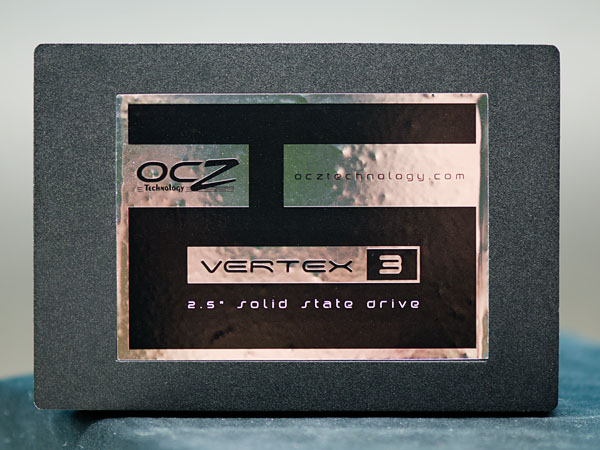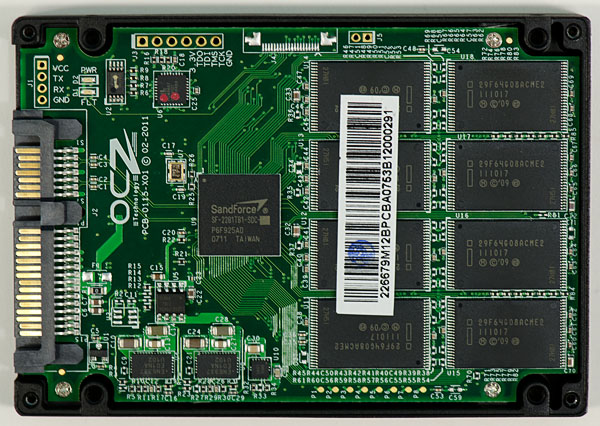The OCZ Vertex 3 Review (120GB)
by Anand Lal Shimpi on April 6, 2011 6:32 PM ESTThe Vertex 3 120GB
Whenever we review a new SSD many of you comment asking for performance of lower capacity drives. While we typically publish the specs for all of the drives in the lineup, we're usually only sampled a single capacity at launch. It's not usually the largest, but generally the second largest and definitely an indicator of the best performance you can expect to see from the family.
Just look at the reviews we've published this year alone:
Intel SSD 510 (240GB)
Intel SSD 320 (300GB)
Crucial m4 (256GB)
While we always request multiple capacities, it normally takes a little while for us to get those drives in.
When OCZ started manufacturing Vertex 3s for sale the first drives off of the line were 120GB, and thus the first shipping Vertex 3 we got our hands on was a more popular capacity. Sweet.
Let's first look at the expected performance differences between the 120GB Vertex 3 and the 240GB drive we previewed earlier this year:
| OCZ Vertex 3 Lineup | |||||
| Specs (6Gbps) | 120GB | 240GB | 480GB | ||
| Max Read | Up to 550MB/s | Up to 550MB/s | Up to 530MB/s | ||
| Max Write | Up to 500MB/s | Up to 520MB/s | Up to 450MB/s | ||
| 4KB Random Read | 20K IOPS | 40K IOPS | 50K IOPS | ||
| 4KB Random Write | 60K IOPS | 60K IOPS | 40K IOPS | ||
| MSRP | $249.99 | $499.99 | $1799.99 | ||
There's a slight drop in peak sequential performance and a big drop in random read speed. Remember our discussion of ratings from earlier? The Vertex 3 was of course rated before my recent conversations with OCZ, so we may not be getting the full picture here.
Inside the 120GB Vertex 3 are 16 Intel 25nm 64Gbit (8GB) NAND devices. Each device has a single 25nm 64Gbit die inside it, with the capacity of a single die reserved for RAISE in addition to the typical ~7% spare area.
The 240GB pre-production drive we previewed by comparison had twice as many 25nm die per package (2 x 64Gbit per NAND device vs. 1 x 64Gbit). If you read our SF-2000 launch article one of the major advantages of the SF-2000 controller has over its predecessor is the ability to activate twice as many NAND die at the same time. What does all of this mean for performance? We're about to find out.
RC or MP Firmware?
When the first SF-1500/1200 drives shipped last year they actually shipped with SandForce's release candidate (RC) firmware. Those who read initial coverage of the Corsair Force F100 drives learned that the hard way. Mass production (MP) firmware followed with bug fixes and threatened to change performance on some drives (the latter was resolved without anyone losing any performance thankfully).
Before we get to the Vertex 3 we have to talk a bit about how validation works with SandForce and its partners. Keep in mind that SandForce is still a pretty small company, so while it does a lot of testing and validation internally the company leans heavily on its partners to also shoulder the burden of validation. As a result drive/firmware validation is split among both SandForce and its partners. This approach allows SF drives to be validated heavier than if only one of the sides did all of the testing. While SandForce provides the original firmware, it's the partner's decision whether or not to ship drives based on how comfortable they feel with their validation. SandForce's validation suite includes both client and enterprise tests, which lengthens the validation time.
The shipping Vertex 3s are using RC firmware from SandForce, the MP label can't be assigned to anything that hasn't completely gone through SandForce's validation suite. However, SF assured me that there are no known issues that would preclude the Vertex 3 from being released today. From OCZ's perspective, the Vertex 3 is fully validated for client use (not enterprise). Some features (such as 0% over provisioning) aren't fully validated and thus are disabled in this release of the firmware. OCZ and SandForce both assure me that the SF-2200 has been through a much more strenuous validation process than anything before it.
Apparently the reason for OCZ missing the March launch timeframe for the Vertex 3 was a firmware bug that was discovered in validation that impacted 2011 MacBook Pro owners. Admittedly this has probably been the smoothest testing experience I've encountered with any newly launched SandForce drive, but there's still a lot of work to be done. Regardless of the performance results, if you want to be safe you'll want to wait before pulling the trigger on the Vertex 3. SandForce tells me that the only difference between RC and MP firmware this round is purely the amount of time spend in testing - there are no known issues for client drives. Even knowing that, these are still unproven drives - approach with caution.
The Test
| CPU |
Intel Core i7 965 running at 3.2GHz (Turbo & EIST Disabled) Intel Core i7 2600K running at 3.4GHz (Turbo & EIST Disabled) - for AT SB 2011, AS SSD & ATTO |
| Motherboard: |
Intel DX58SO (Intel X58) Intel H67 Motherboard |
| Chipset: |
Intel X58 + Marvell SATA 6Gbps PCIe Intel H67 |
| Chipset Drivers: |
Intel 9.1.1.1015 + Intel IMSM 8.9 Intel 9.1.1.1015 + Intel RST 10.2 |
| Memory: | Qimonda DDR3-1333 4 x 1GB (7-7-7-20) |
| Video Card: | eVGA GeForce GTX 285 |
| Video Drivers: | NVIDIA ForceWare 190.38 64-bit |
| Desktop Resolution: | 1920 x 1200 |
| OS: | Windows 7 x64 |












153 Comments
View All Comments
casteve - Thursday, April 7, 2011 - link
Great review! Thanks for carrying the 120GB torch :)I'd love to see a couple of HDDs added to the 2011 bench (like they are in the 2010 bench) to keep the perspective in play.* Most people are still moving from an HDD to an SSD and not just upgrading their SSD's.
* stuff a 120GB SSD in yer laptop for $200 to replace a 5400rpm HDD and improve gaming IOPS by 5x is more impressive than replacing an existing 120GB SSD with a newer one for $250 and improve gaming IOPS by 10%. Extreme example...but you get the idea.
Gasaraki88 - Thursday, April 7, 2011 - link
I want to thank you for writing this article and keeping the companies honest. Without smart people like you, companies will overstate performance and to the common person it will look fine because we don't have the proper tools to test.I'll been reading Anandtech for 11 years now. The quality is still top notch unlike some other sites I used to go to.
cknobman - Thursday, April 7, 2011 - link
Dont buy OCZ products.Anand and countless consumer reviews from Newegg have proved that OCZ does not put out a consistent and reliable level of product.
Im not one for rolling the crap dice with my hundreds of hard earned dollars.
hackztor - Thursday, April 7, 2011 - link
LOL, okay go spend your hard earned money on last year performance intel new drives.seapeople - Thursday, April 7, 2011 - link
Wow you got him there! Yeah, why doesn't he just buy an Intel drive. That would be funny because then he would have to wait 5.6 seconds to open Photoshop instead of 5.2 seconds. Or it would take a full 33 seconds to reboot instead of 35 seconds. I bet he's so unintelligent that he would actually accept crappy last-generation solid state drive performance like that at a lower price.semo - Friday, April 8, 2011 - link
Corsair, patriot and many other SSD makers use SF controllers. You just have to be sure you know what firmware you're getting. You have to be much more careful with OCZ as you can't trust them to sell you what they claim on the box.Stargrazer - Thursday, April 7, 2011 - link
It's awesome that you're reviewing the 120GB version first. It's the version that I believe most people would be most interested in getting, so it's great that we'll be able to see how it performs, rather than only seeing the higher numbers of a ~256GB version that's so expensive that most people would never get it. It's fantastic even. Did I mention that it's awesome?Unfortunately, since the ~128GB versions haven't always been reviewed in the past, this also means that we don't really have much to compare the numbers to. How do we know if the 120GB Vertex 3 is competitive if we don't know the performance of its competitors?
I can understand if it might take a while to get the numbers for comparable versions of the 510, 310 and m4 (though I really hope that in the future you continue to press on for getting ~128GB versions in time for the initial reviews), but would it at least be possible to get the complete numbers for the 128GB version of the RealSSD C300? For some reason it doesn't seem to be in the IOmeter tests.
Oh. Isn't it time that you stopped using "I didn't expect to have to debut this so soon" in the introduction to the 2011 Storage Bench? :)
KenPC - Thursday, April 7, 2011 - link
A humorous thought of little relevance. but.. if OCZ rebrands the Vertex 2 as the 2b to solidify performance specs. then as I shop I will be thinking....Is this OCZ drive a 2b or not 2b, that is the question.....
Omid.M - Thursday, April 7, 2011 - link
They saw Anand's Vibrams and knew he meant business (casual).:)
sethm1 - Thursday, April 7, 2011 - link
I was looking forward to the Vertex 3 as being the next best thing.And so was hoping for a more positive review (but yes appreciate the candor in the review).
My question is, after all is said and done, is the Vertex 3 still better than the Vertex 2 (120GB versions)?
Should I go out and get a version 2?